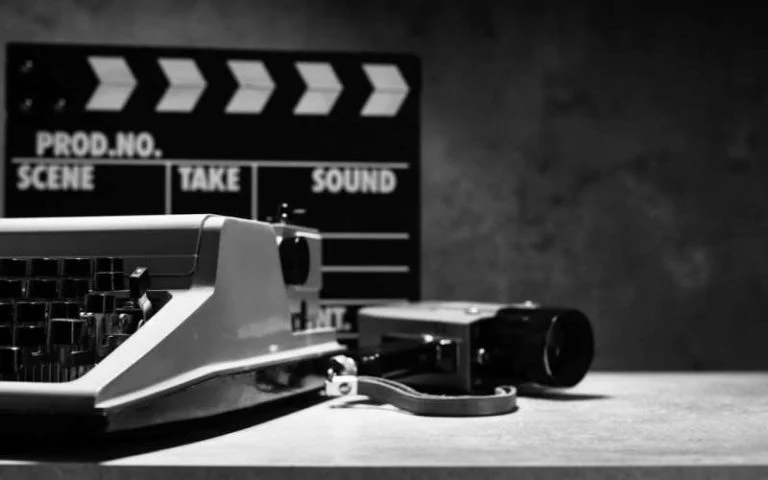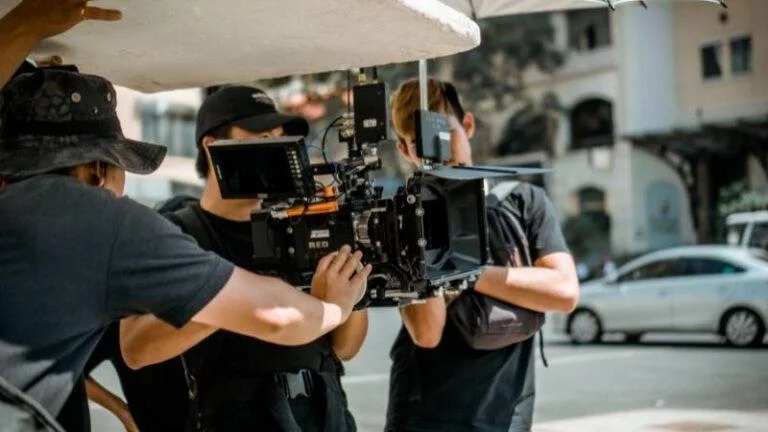Welcome to our comprehensive guide on indie film contracts, taking you from script to screen and providing invaluable insights into the legal landscape of filmmaking. In this article, we will explore the importance of understanding filmmaker law and the role it plays in protecting the rights and interests of indie filmmakers. We will also introduce you to Creators Legal, the first and only do-it-yourself platform for creators to get fully legal without the need for expensive lawyers.
Key Takeaways in Indie Film Contracts

- Pre-production is an essential phase in the filmmaking process where all preparations for the shoot are made.
- The director plays a crucial role in pre-production, determining the style and visual look of the film, casting and rehearsing with actors, and collaborating with various departments.
- Creating agreements and contracts is essential to protect the filmmaker’s work throughout the production process.
- The script breakdown and shooting schedule are key components of pre-production, helping determine the budget, schedule, and necessary resources.
- Location scouting, set design, visual effects, stunts, and tests are important aspects of pre-production that contribute to the overall creative vision of the film.
Table of Contents
Understanding Filmmaker Law
Filmmaker law is a complex web of legal considerations that indie filmmakers must navigate to protect their creative work, and Creators Legal offers an accessible solution. This platform serves as a do-it-yourself resource, eliminating the need for expensive lawyers. By understanding the intricacies of filmmaker law, indie filmmakers can confidently navigate the legal landscape and safeguard their projects.
During the pre-production phase, filmmakers encounter a myriad of legal challenges. From acquiring the necessary permits and licenses to drafting contracts with actors and crew members, the legal aspects of filmmaking can be overwhelming. However, with the guidance and resources offered by Creators Legal, indie filmmakers can navigate these challenges with ease.
| Key Features of Creators Legal: |
| Comprehensive contract templates for various agreements, such as actor agreements and director agreements |
| Guidance on legal requirements and considerations during pre-production |
| Resources for understanding intellectual property rights, copyright, and distribution |
| An affordable and accessible alternative to hiring expensive lawyers |
Creators Legal empowers indie filmmakers to protect their work and navigate the legal landscape with confidence. By providing comprehensive contract templates and valuable legal guidance, this platform ensures that filmmakers have the tools they need to handle the legal aspects of their projects effectively. With Creators Legal, indie filmmakers can focus on their creative vision, knowing that their legal obligations are covered. For a deeper dive into the essentials of art contracts, check out our detailed guide on the key elements artists should include in every contract.
Importance of Indie Film Contracts
Indie film contracts serve as vital tools for protecting the rights and interests of filmmakers, ensuring that all parties involved are held accountable for their obligations. In the dynamic world of independent filmmaking, where budgets may be limited and resources scarce, having clear and comprehensive contracts is crucial to avoid potential disputes and legal complications.
These contracts establish the legal framework that governs the relationships and responsibilities between key stakeholders, such as actors, directors, producers, and crew members. They outline the terms and conditions under which the film will be created, distributed, and monetized, safeguarding the intellectual property rights and creative vision of the filmmaker.
By defining the scope of work, payment terms, confidentiality provisions, and dispute resolution mechanisms, indie film contracts provide a solid foundation for a successful production. They ensure that everyone involved is on the same page and working towards a shared goal, minimizing the risk of misunderstandings and conflicts.
Types of Indie Film Contracts

There are several key agreements that indie filmmakers should consider during the pre-production phase. These include but are not limited to:
- Actor Agreements: These contracts establish the terms and conditions for actors’ involvement in the film, covering aspects such as compensation, usage rights, and contribution to marketing.
- Director Agreements: These contracts outline the director’s role and responsibilities, including creative control, compensation, and rights to final cut.
- Crew Agreements: These contracts cover the engagement of various crew members, specifying their roles, working hours, payment terms, and other relevant details.
- Location Agreements: These contracts establish the terms for the use of filming locations, including permissions, insurance requirements, and indemnification clauses.
By having these contracts in place, indie filmmakers can protect their work, their team, and their investment, allowing them to focus on the creative aspects of their project without unnecessary legal concerns.
| Benefits of Indie Film Contracts | Examples of Indie Film Contracts |
| Clear expectations and responsibilities Protection of intellectual property rights Minimization of legal disputes Enhanced collaboration and trust among stakeholders | Screenwriter Agreement Composer Agreement Distribution Agreement Non-Disclosure Agreement |
The Pre-Production Phase
Pre-production lays the foundation for a successful film, encompassing crucial steps such as script breakdown, budgeting, crew selection, and legal preparations that ensure a smooth journey from script to screen. This phase is essential in bringing the filmmaker’s vision to life and setting the groundwork for a well-executed production. From idea to contract, empower your creative partnerships with legally sound solutions. Explore the comprehensive guide here and ensure a smooth journey from concept to collaboration.
Script Breakdown and Shooting Schedule
One of the key aspects of pre-production is the script breakdown and shooting schedule. This process involves analyzing the script in detail to identify all the elements required for production, such as locations, props, costumes, and special effects. By breaking down the script, filmmakers can create an accurate shooting schedule that outlines the order in which scenes will be filmed and the resources needed for each.
| Benefits of Script Breakdown and Shooting Schedule | Example |
| – Efficient allocation of resources | – Determines the number of shooting days required |
| – Budget estimation | – Helps in calculating production costs |
| – Smooth workflow | – Ensures a structured and organized production process |
Location Scouting and Set Design
In pre-production, filmmakers embark on the process of location scouting and set design. Location scouting involves finding suitable filming locations that align with the script’s requirements. Filmmakers visit various potential locations, assessing their suitability in terms of logistics, aesthetics, and legal considerations. Once locations are finalized, the set design process begins, where production designers and art directors collaborate to create visually captivating sets that enhance the storytelling process.
“The location can become a character itself, influencing the mood and atmosphere of the film.” – John Doe, Production Designer
The Director’s Role in Pre-Production

The director plays a pivotal role in the pre-production phase, shaping the visual style of the film and collaborating with cast and crew members to ensure a cohesive and successful production. During this critical stage, the director’s creative vision takes shape as they work closely with the cinematographer, production designer, and other key departments to establish the look and feel of the film. Navigate your self-publishing journey confidently with affordable and customizable contracts for illustrators, ghostwriters, editors, marketers, and more.
One of the director’s primary responsibilities during pre-production is casting and rehearsing with the actors. They carefully select the right talent to bring the characters to life and guide them in understanding their roles. Through rehearsals, the director helps the actors develop their performances and ensures they align with the overall vision for the film.
Director Agreements
During pre-production, it is vital for the director to establish clear agreements with the production company or individuals financing the project. These director agreements outline the director’s creative control, compensation, and other important terms. By having these agreements in place, both the director and the production company can protect their interests and ensure a smooth working relationship throughout the production process.
| Key Responsibilities in Pre-Production | Collaborating Departments |
| Casting and rehearsing with actors | Acting department |
| Creating the visual style | Cinematography and production design departments |
| Developing director agreements | Production and legal departments |
Script Breakdown and Shooting Schedule
Script breakdown and shooting schedule are vital components of pre-production, providing a roadmap that guides budgeting, scheduling, and resource allocation for the entire production team. A script breakdown involves analyzing the screenplay to identify every element that needs to be executed on screen, such as locations, characters, props, wardrobe, and visual effects. This process helps determine the scope of the production and provides a clear understanding of the resources required.
Once the script breakdown is complete, the shooting schedule is created. This schedule outlines the order in which scenes will be filmed, taking into account factors such as location availability, actor availability, and continuity. It ensures a smooth flow of production, optimizing time and resources.
Sample Script Breakdown and Shooting Schedule
| Scene | Location | Characters | Props |
| 1 | Living Room | John, Sarah | Coffee Mug |
| 2 | Kitchen | Sarah | Knife |
The above table is a simplified example of a script breakdown and shooting schedule. Each scene is assigned a number, followed by details regarding the location, characters involved, and props required. This breakdown allows the production team to estimate the costs associated with each scene and plan accordingly.
Location Scouting and Set Design
Location scouting and set design are integral aspects of pre-production, ensuring that the film’s visuals align with the director’s vision while adhering to legal requirements. Location scouting involves finding suitable filming locations that match the script’s requirements and enhance the storytelling process. It involves exploring various options, conducting site visits, and considering practical aspects such as accessibility, permits, and safety regulations.
When it comes to location agreements and set design contracts, legal considerations are paramount. These contracts outline the rights and responsibilities of all parties involved, including the production company, location owners, and set designers. They ensure that any permits, insurance, and safety measures are in place, protecting both the filmmakers and the location owners.
By carefully scouting locations and meticulously designing sets, filmmakers can create a visually stunning and immersive experience for the audience, while also safeguarding the legal and logistical aspects of their production.
| Key Points |
| Location scouting and set design are crucial for aligning the film’s visuals with the director’s vision. |
| Location scouting involves finding suitable filming locations and considering legal requirements. |
| Set designers create sets that bring the film’s world to life and work closely with the director and production designer. |
| Location agreements and set design contracts ensure legal protection for all parties involved. |
Visual Effects, Stunts, and Tests
Visual effects, stunts, and tests play a significant role in the pre-production phase, adding depth and excitement to the storytelling process while adhering to legal and safety protocols. In the world of filmmaking, visual effects have become an integral part of creating captivating and immersive cinematic experiences. Whether it’s the creation of otherworldly creatures or the realization of fantastical environments, visual effects allow filmmakers to bring their imagination to life. From computer-generated imagery (CGI) to practical effects, the use of VFX requires careful planning and coordination during pre-production.
During pre-production, filmmakers must consider the legal and safety aspects of incorporating stunts into their films. Stunt performers are trained professionals who execute high-risk actions onscreen, such as car chases, fight scenes, or daring acrobatics. It is crucial to ensure that the chosen stunts are carefully choreographed and rehearsed to mitigate the risk of injury.
Additionally, filmmakers must obtain the necessary permits and insurance coverage to protect the cast, crew, and production company from potential liabilities. This includes acquiring stunt coordination services and adhering to industry safety standards.
Tests are another crucial element of pre-production. These tests, which can include camera tests, makeup tests, or even auditions, help filmmakers make informed decisions about the visual and technical aspects of their film. Camera tests allow directors and cinematographers to experiment with different lighting setups, lenses, and camera movements to achieve the desired visual aesthetic.
Makeup tests, on the other hand, enable makeup artists to perfect the look of characters by considering factors such as lighting conditions and color schemes. Auditions are essential for casting the right actors and assessing their suitability for specific roles.
Table: Pre-production Tasks and Considerations
| Tasks | Considerations |
| Visual Effects | Storyboarding and pre-visualization Collaboration with VFX artists Cost estimation Integration with practical effects |
| Stunts | Stunt coordination and safety planning Permits and insurance coverage Selection of trained stunt performers Choreography and rehearsals |
| Tests | Camera tests – lighting, lenses, and camera movements Makeup tests – color schemes and lighting conditions Auditions – assessing actor suitability for roles |
Financial and Legal Logistics
Financial and legal logistics are crucial components of successful pre-production, requiring careful attention to insurance, budgets, and legal contracts to safeguard the production. Indie filmmakers must navigate these aspects to ensure compliance, protect their work, and mitigate potential risks. Here are some key considerations when it comes to financial and legal logistics in pre-production:
Insurance
Acquiring insurance coverage is essential to protect the production against unexpected accidents, damages, or liabilities. Depending on the nature of the film, filmmakers may need general liability insurance, equipment insurance, and errors and omissions insurance (E&O), among others. Insurance coverage provides peace of mind and safeguards both the production and its participants.
Budgeting
Establishing a comprehensive budget is crucial during pre-production. Filmmakers need to carefully assess their financial resources and allocate funds accordingly. This includes accounting for various expenses, such as location fees, equipment rentals, crew salaries, and post-production costs. A well-planned budget ensures that the production stays within financial boundaries and enables effective resource management.
Legal Contracts
Creating proper legal contracts is vital to protect the interests of all parties involved in the production. Filmmakers should consider agreements such as location agreements, crew agreements, and actor agreements to establish clear rights, responsibilities, and compensation terms. These contracts help prevent misunderstandings or disputes and provide a legal framework for all involved parties.
Table: Common Legal Contracts in Pre-Production
| Contract Type | Purpose |
| Location Agreements | Establishes terms for using specific filming locations, including fees, access limitations, and liability. |
| Crew Agreements | Outlines the roles, responsibilities, and compensation terms for crew members involved in the production. |
| Actor Agreements | Covers the rights, obligations, and payment terms for actors participating in the film. |
By paying careful attention to financial and legal logistics in pre-production, indie filmmakers can ensure a smooth and successful production process. Addressing insurance, budgeting, and legal contracts early on helps protect against potential risks and ensures that all parties involved are on the same page.
Collaborating with Crew and Departments
Successful pre-production relies on effective collaboration between the filmmaking team, emphasizing the need for clear agreements and contracts to establish expectations and responsibilities. This collaborative effort involves selecting and working closely with the crew and various departments to ensure a smooth and well-coordinated production process.
One crucial aspect of collaborating with the crew is crew selection. The crew members, including the cinematographer, production designer, costume designer, and sound engineer, play integral roles in bringing the director’s vision to life. It is essential to carefully evaluate the skills, experience, and compatibility of potential crew members to ensure their contribution aligns with the overall creative direction of the film.
In addition to crew selection, effective collaboration with different departments is vital. Each department, such as art, costume, and makeup, brings its unique expertise and creative input to the project. Collaborating closely with these departments allows for seamless coordination and alignment of artistic choices. This collaboration ensures that all aspects of the production, from set design to costumes and makeup, contribute cohesively to the visual storytelling.
Table: Key Departments in Pre-production
| Department | Responsibilities |
| Art Department | Responsible for designing and constructing sets, props, and other visual elements that enhance the film’s aesthetic. |
| Costume Department | Creates and maintains costumes for the cast, ensuring they align with the characters and overall visual style of the film. |
| Makeup Department | Responsible for makeup application, prosthetics, and hairstyling to enhance the appearance of the cast and create desired visual effects. |
| Camera Department | Handles the technical aspects of cinematography, including camera operation, lighting, and camera movement. |
| Sound Department | Records and handles sound during the production, ensuring high-quality audio for dialogue, ambiance, and music. |
Protecting Your Work with Agreements
Creating comprehensive agreements and contracts is an essential step in protecting your work as a filmmaker, ensuring that your rights are safeguarded and potential legal disputes are minimized. Filmmaker law can be complex, but with the right agreements in place, you can have peace of mind knowing that your creative vision is protected and that you have a solid legal foundation for your project.
One of the key agreements to consider is the intellectual property agreement. This agreement defines who owns the rights to the intellectual property created during the production, such as the screenplay, music, and visual elements. It ensures that you have the sole rights to exploit and monetize your work, preventing any unauthorized use or infringement.
Another important agreement is the distribution agreement. This contract outlines the terms and conditions for the distribution of your film, including the territories, media platforms, and revenue sharing arrangements. It ensures that you have control over the distribution process and that you receive your rightful share of the profits.
Table: Indie Film Contracts Essential Agreements for Filmmakers
| Agreement | Purpose |
| Intellectual Property Agreement | Defines ownership of creative assets |
| Distribution Agreement | Outlines terms for film distribution |
| Actor Agreement | Establishes terms for actor participation |
| Director Agreement | Defines director’s role and creative control |
| Location Agreement | Specifies terms for filming on location |
Creators Legal: Empowering Indie Filmmakers

Creators Legal is a groundbreaking DIY platform specifically designed to empower indie filmmakers with comprehensive knowledge and tools to navigate the intricacies of filmmaker law without the need for costly legal assistance. As an indie filmmaker, understanding the legal aspects of your work is crucial to protect your rights and interests. With Creators Legal, you have access to a user-friendly platform that provides all the resources and guidance you need to create legally binding agreements and contracts.
Indie film contracts at your fingertips
By leveraging Creators Legal, you can save time and money by avoiding the expensive fees associated with hiring lawyers. This innovative platform offers a wide range of templates and customizable documents specifically tailored to the needs of indie filmmakers. Whether you require actor agreements, director agreements, location agreements, or distribution contracts, Creators Legal has you covered.
In addition to offering ready-made templates, Creators Legal also provides educational materials and guides to help you navigate the legal landscape. With step-by-step instructions and clear explanations, you can confidently handle all the legal aspects of your filmmaking journey. Creators Legal empowers you to protect your work, secure your intellectual property rights, and ensure the smooth execution of your projects.
Don’t let legal hurdles hinder your creative ambitions. With Creators Legal, you can take control of the legal aspects of your filmmaking career and focus on what you do best – telling compelling stories. Join the community of indie filmmakers who are taking advantage of this invaluable resource and empower yourself with the knowledge and tools to navigate filmmaker law.
| Benefits of Creators Legal: |
| Access to a wide range of legally binding templates and agreements |
| Customizable documents tailored to the specific needs of indie filmmakers |
| Educational materials and guides to navigate the legal landscape |
| Affordable and accessible alternative to expensive legal counsel |
Become One of 8,000+ Innovators Transforming the Future your Business!
Subscribe and access over 300 editable and downloadable contracts
Mastering the Legal Landscape
By mastering the Indie film contracts landscape, indie filmmakers can confidently navigate the intricacies of filmmaker law, safeguarding their work and allowing their creative visions to flourish. Understanding the legal aspects of the filmmaking process is crucial for protecting intellectual property rights, ensuring compliance with relevant laws and regulations, and avoiding potential legal disputes. With the right knowledge and resources, indie filmmakers can confidently tackle the legal challenges they may encounter.
One valuable resource available to indie filmmakers is Creators Legal, the first and only DIY platform designed specifically for creators to get fully legal without the need for expensive lawyers. Through Creators Legal, filmmakers can access comprehensive guides, templates, and step-by-step instructions to navigate the legal landscape with ease. This platform offers a cost-effective and accessible alternative to traditional legal counsel, empowering filmmakers to protect their work and make informed decisions throughout the filmmaking process. Ask for our indie film contracts templates!
During the pre-production phase, indie filmmakers face a range of legal considerations. From acquiring insurance and managing financial logistics to selecting and collaborating with crew members, each step requires careful attention to legal obligations and agreements. Script breakdowns and shooting schedules play a vital role in organizing the production, ensuring budget and resource allocation align with the creative vision. Location scouting, set design, and visual effects, among other elements, require legal contracts to safeguard intellectual property rights and protect the interests of all parties involved.
Table 1: Essential Legal Considerations in Pre-Production
| Aspect | Related Legal Considerations |
| Insurance | Acquire appropriate insurance coverage for the production, including general liability and equipment coverage. |
| Budgeting | Create a detailed budget that accounts for legal costs, permits, and licenses. |
| Crew Selection | Establish clear agreements with crew members, outlining their roles, responsibilities, and compensation. |
| Location Agreements | Negotiate and sign location agreements to secure filming locations and address potential liabilities. |
| Set Design Contracts | Ensure legal protection and intellectual property rights for set designs through proper contracts. |
FAQ about indie film contracts
What is pre-production in filmmaking?
Pre-production is the phase in filmmaking where all preparations are made for the shoot. This includes designing and planning every step of creating the film, such as storyboarding and visualizing the production, creating a production budget, acquiring insurance, working out financial logistics, and selecting and hiring the crew members.
What role does the director play during pre-production?
The director plays a crucial role during pre-production. They determine the style and visual look of the film, cast and rehearse with actors, and collaborate with various departments to ensure a cohesive vision for the project. They also work on creating agreements and contracts to protect the work and establish their creative vision.
What are the key components of pre-production?
Key components of pre-production include script breakdown and shooting schedule, location scouting and set design, visual effects and stunts, and financial and legal logistics. These tasks help determine the budget, schedule, and necessary resources for the film, ensuring a smooth production process.
Why are indie film contracts important?
Indie film contracts are important because they safeguard the rights and interests of filmmakers. They establish legal obligations and protect the intellectual property rights, copyright, and distribution of the film. Examples of key agreements include actor agreements and director agreements.
Can I protect my work during pre-production with Indie film contracts?
To protect your work during pre-production, it is crucial to create agreements and Indie film contracts that cover areas such as intellectual property rights, copyright, and distribution. These agreements ensure that your work is legally protected and help mitigate potential legal disputes.






